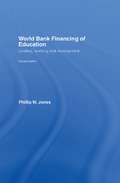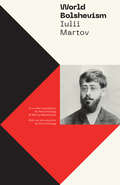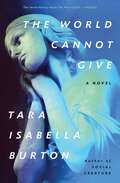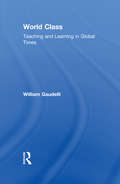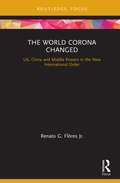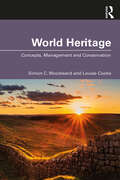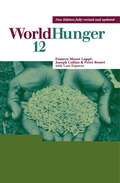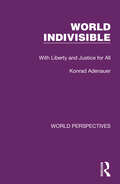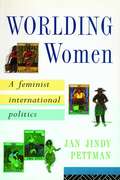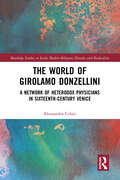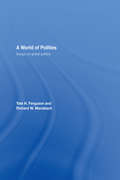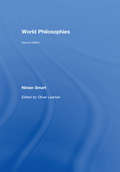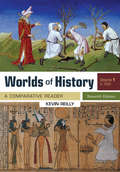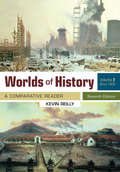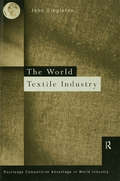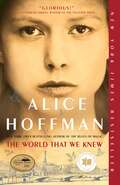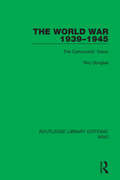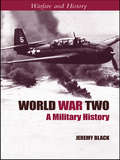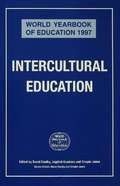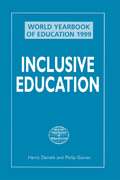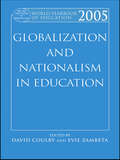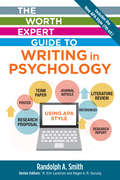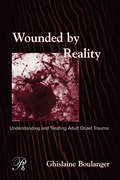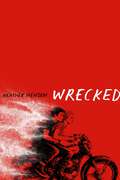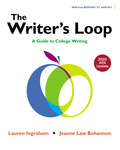Special Collections
Benetech’s Global Certified Accessible Titles
Description: Benetech’s GCA program is the first independent third-party EPUB certification to verify ebook accessibility. By creating content that is born accessible, publishers can meet the needs of all readers. Learn more: https://bornaccessible.benetech.org/
- Table View
- List View
World Bank Financing of Education
by Phillip W. JonesBased on detailed analysis of thousands of confidential World Bank documents, this book demonstrates that the World Bank lies at the centre of the major changes in global education of our time. It outlines the evolution of World Bank lending policies in education, and assesses the policy impact of the Bank's educational projects, looking at how it has: shaped the economic and social policies of many governments, including policies that affect education been an influential proponent of the rapid expansion of formal education systems around the world, financing much of that expansion been instrumental in forging those policies that see education as a precursor to modernisation served as a major purveyor of Western ideas about how education and the economy are, or should be, related. Following on from the success of the first edition, this revised edition covers topical issues of globalisation and looks into the political debate concerning aid to developing countries. It will be of enormous value to those studying, or working in, educational policy in developing countries, international organisations and financial institutions, and aid agencies.
World Bolshevism
by Iulii MartovBeginning in 1903, the Russian Social Democratic Labour Party was divided into opposing sections, one led by Vladimir Lenin, the other by Iulii Martov. Until 1917, both Lenin and Martov were equally prominent figures in Russian politics. Martov, an anti-war socialist intellectual from a Jewish background, wrote prolifically for a number of important publications inside and outside Russia. Although the books, articles, and pamphlets written by Lenin during the same period remain readily available today, those by Martov are extremely hard to find in their original Russian or in translation. Following Martov’s untimely death in 1923, a Russian-language edition of one of his books, World Bolshevism, was published. But it was only in 2000, after decades of extreme censorship, that parts of the book were legally published in Russia. In English, this work has reached the public in pieces, often as a part of pamphlets with limited circulation. This edition, which includes an introduction by Paul Kellogg that contextualizes the work and reintroduces Martov as an important thinker to a twenty-first century readership, makes Martov’s work available in its complete form for the first time in a hundred years.
The World Cannot Give
by Tara Isabella Burton&“The Secret History meets The Price of Salt&” (Vogue) in this &“equal parts dangerous and delicious&” (Entertainment Weekly) novel about queer desire, religious zealotry, and the hunger for transcendence among the members of a cultic chapel choir at a Maine boarding school—and the ambitious, terrifyingly charismatic girl that rules over them. When shy, sensitive Laura Stearns arrives at St. Dunstan&’s Academy in Maine, she dreams that life there will echo her favorite novel, All Before Them, the sole surviving piece of writing by Byronic &“prep school prophet&” (and St. Dunstan&’s alum) Sebastian Webster, who died at nineteen, fighting in the Spanish Civil War. She soon finds the intensity she is looking for among the insular, Webster-worshipping members of the school&’s chapel choir, which is presided over by the charismatic, neurotic, overachiever Virginia Strauss. Virginia is as fanatical about her newfound Christian faith as she is about the miles she runs every morning before dawn. She expects nothing short of perfection from herself—and from the member of the choir. Virginia inducts the besotted Laura into a world of transcendent music and arcane ritual, illicit cliff-diving and midnight crypt visits: a world that, like Webster&’s novels, finally seems to Laura to be full of meaning. But when a new school chaplain challenges Virginia&’s hold on the &“family&” she has created, and Virginia&’s efforts to wield her power become increasingly dangerous, Laura must decide how far she will let her devotion to Virginia go. The World Cannot Give is a &“hypnotic and intense&” (Shondaland) meditation on the power, and danger, of wanting more from the world.
World Class
by William GaudelliHow have school curricula been affected by the ripple effects of globalization? How do teachers and students attempt to understand their complex world? Most states require world teaching in some form, yet little is known about how teachers and students engage in this critical curricular area. World Class: Teaching and Learning in Global Times directly fills this need by providing a detailed, inside look at global education in three high schools. The data from the study, drawn from extensive interviews and observations, illustrate the daily challenges and complexities of global teaching and learning. Comprehensive yet scholarly, this volume: *raises thought-provoking questions for both theorists and practitioners; *addresses controversial issues embedded in global education and throughout the social studies curriculum, such as the tension between universalism and cultural relativism, the problematic nature of identity in classroom discourse, and the apparent duality of national and global loyalties; *connects issues particular to global education with wider scholarship in education; *examines the interplay of theory and practice in global education and, more broadly, the social sciences; and *provides an exploratory and provocative look at dimensions of global civics, with an analysis of the events of 9/11/01 and how they have shaped global perspectives about living as one planet. The book is organized in three parts--contexts, problems, and alternatives. Contexts allows readers to consider global education from multiple perspectives: teacher, student, administrator, community member, and scholar. Problems focuses on pedagogical challenges associated with global education. Alternatives provides reflection points that encourage readers to consider different ways we might converse about global teaching and learning. Written for scholars, practitioners, and students in social studies, curriculum and instruction, global/multicultural education, and related fields, World Class: Teaching and Learning in Global Times is an excellent text for preservice and graduate-level courses in these areas.
The World Corona Changed
by Renato G. Flôres Jr.This concise book addresses the new geopolitical realm which will ensue from the coronavirus pandemic, exploring how the main international actors will position themselves in the post-Covid-19 realities. Contrary to some analysts, the author argues that, rather than an acceleration of existing or latent trends, the post-coronavirus world will present novel and otherwise unexpected features and challenges. Even the previously ongoing tension between the US and China will morph into an additionally complex and multidimensional puzzle, making it much more difficult to manage. In this book, the author provides a few basic tools for further analysis of the evolution of the new world situation, in an innovative way. Two main axes orient how analyses will be performed: the shape and evolution of the US–China relationship (and their interactions with other international actors), and the degree of co-operation — for example, on climate change and security arrangements — in the transformed world. The author suggests that the pandemic will be responsible for new emergences and fractures, and yet our ever more divided world will at the same time support unifying forces and links, highly dependent on technological developments being shared and/or protected. The primary objective of this book is to draw a broad picture which will serve as a frame of reference for analysing how the community of international actors will react to major challenges — be they expected or unanticipated — in the post-pandemic world. It will be of immense interest to analysts, academics, politicians and students of international relations, geopolitics, strategy, and world affairs.
World Heritage
by Simon C. Woodward and Louise CookeWorld Heritage: Concepts, Management and Conservation presents an insight into discussions and debates surrounding the UNESCO World Heritage List, and the properties on it. Since its creation 50 years ago, the World Heritage Convention has been lauded as one of the most successful international expressions of cooperation, whilst at the same time being widely criticised as producing an overly commercialised and globalised sense of heritage. Offering an in-depth discussion of both sides of the debate, this book explores these issues by discussing the following topics: • How the World Heritage Convention was conceived and how it is operationalised; • How the World Heritage concept is currently being used and misused; • The benefits of inscription – perceived and actual existential threats faced by World Heritage Site managers including climate change, urban development, overtourism, military action and natural disaster; • The future of World Heritage as an instrument for conservation and economic development. Case studies from a global range of World Heritage Sites are included throughout, to showcase some of the successes and also missuses of World Heritage status. This book will be of pivotal interest to students and scholars in the fields of tourism, heritage, archaeology, natural resource management and development studies.
World Hunger
by Joseph CollinsThe revised edition of this text includes substantial new material on hunger in the aftermath of the Cold War; global food productioin versus population growth; changing demographics and falling birth rates around the world; the shifting focus of foreign assistance in the new world order; structural adjustment and other budget-slashing policies; trade liberalization and free trade agreements; famine and humanitarian interventions; and the thrid worldization of developed nations.
World Indivisible
by Konrad AdenauerOriginally published in the UK in 1956, this book presents the essence of the political philosophy of one of Europe’s best-known post-war statesmen, as well as his experience in government as head of Germany in one of its most critical periods of history. The role of Germany in a (then) new Europe is discussed, along with its rearmament, its greatly restored economic power and its relation to NATO. Germany’s Chancellor gives his views on the world struggle, the cold war, Germany and America, Germany and Israel and the difficulties and responsibilities of the alliance of free nations.
Worlding Women
by Jan Jindy PettmanIn Worlding Women Jan Jindy Pettman asks 'Where are the women in international relations'? She develops a broad picture of women in colonial and post-colonial relations; racialized, ethnic and national identity conflicts; in wars, liberation movements and peace movements; and in the international political economy.Bringing contemporary feminist theory together with women's experiences of the `international', Pettman shows how mainstream international relations is based on certain constructions of masculinity and femininity. Her ground-breaking analysis has implications for feminist politics as well as for the study of international relations.
The World of Girolamo Donzellini
by Alessandra CelatiGirolamo Donzellini was born in 1513. He was a religious dissenter, a physician, and a bibliophile involved in the Medical Republic of Letters. He was put to death by the Venetian Inquisition in 1587, after being tried five times in his lifetime. Extending beyond an individual case study to a granular and probing account of the many connections between Venetian physicians and heterodox religious movements in the wake of the Protestant Reformation, this innovative monograph reveals the heretical networks of physicians in sixteenth-century Venice. In addition to Donzellini himself, the web of actors includes printers, scholars, women, and alchemists who were all committed to fighting against religious dogma and violence in a time and place when both were the order of the day. This book will appeal to researchers and students alike interested in the History of Medicine, the History of religious heterodoxy and tolerance, as well as the History of the Catholic Inquisition in Venice.
A World of Polities
by Richard W. Mansbach and Yale H. FergusonYale H. Ferguson and Richard W. Mansbach have made a significant contribution to our contemporary understanding of global politics. This collection contains some of their classic essays and many unpublished articles which have been edited into a coherent and stimulating collection. Subjects covered include: Theory and method in global politics The role of values and the postmodern challenge The complex roles of actors in global politics 9/11 and its aftermath The changing nature of war US unilateralism, hegemony and empire.
World Philosophies
by Ninian Smart and Oliver LeamanWorld Philosophies presents in one volume a superb introduction to all the world’s major philosophical and religious traditions. Covering all corners of the globe, Ninian Smart’s work offers a comprehensive and global philosophical and religious picture. In this revised and expanded second edition, a team of distinguished scholars, assembled by the editor Oliver Leaman, have brought Ninian Smart’s masterpiece up to date for the twenty-first century. Chapters have been revised by experts in the field to include recent philosophical developments, and the book includes a new bibliographic guide to resources in world philosophies. A brand new introduction which celebrates the career and writings of Ninian Smart, and his contribution to the study of world religions, helps set the work in context.
Worlds of History, Volume 1
by ReillyWorlds of History offers a flexible comparative and thematic organization that accommodates a variety of teaching approaches and helps students to make cross-cultural comparisons. Thoughtfully compiled by a distinguished world historian and community college instructor, each chapter presents a wide array of primary and secondary sources arranged around a major theme — such as universal religions, the environment and technology, or gender and family — across two or more cultures, along with pedagogy that builds students’ capacity to analyze and interpret sources, and think critically and independently.
Worlds of History, Volume 2
by Kevin ReillyWorlds of History offers a flexible comparative and thematic organization that accommodates a variety of teaching approaches and helps students to make cross-cultural comparisons. Thoughtfully compiled by a distinguished world historian and community college instructor, each chapter presents a wide array of primary and secondary sources arranged around a major theme — such as universal religions, the environment and technology, or gender and family — across two or more cultures, along with pedagogy that builds students’ capacity to analyze and interpret sources, and think critically and independently.
World Textile Industry
by John SingletonThis book analyzes the competitive forces which dominate this major sector, and traces how the nature of competition has evolved during the last two hundred years. Through an analysis of key factors, including demand, related and supporting industries, firm strategy, structure and national rivalry, chance and government policy, the author explains how and why the locus of competitive advantage in textiles and apparel has moved from country to country, particularly in the period since 1945.
The World That We Knew
by Alice Hoffman“Oh, what a book this is! Hoffman’s exploration of the world of good and evil, and the constant contest between them, is unflinching; and the humanity she brings to us—it is a glorious experience. The book builds and builds, as she weaves together, seamlessly, the stories of people in the most desperate of circumstances—and then it delivers with a tremendous punch. It opens up the world, the universe, in a way that it absolutely unique. By the end you may be weeping.” —Elizabeth Strout, Pulitzer Prize–winning author of Olive Kitteridge “Alice Hoffman’s new novel will break your heart, and then stitch it back together piece by piece. It’s about love and loss, about history and the world today, about what happens when man goes against the laws of nature for good and for evil. It’s my new favorite Hoffman book—and if you know how much I adore her writing, that’s truly saying something.” —Jodi Picoult, New York Times bestselling author of Small Great Things and A Spark of Light “An exceptionally voiced tale of deepest love and loss...one of [Hoffman’s] finest. WWII fiction has glutted the market, but Hoffman’s unique brand of magical realism and the beautiful, tender yet devastating way she explores her subject make this a standout.” —Booklist (starred review) In 1941, during humanity’s darkest hour, three unforgettable young women must act with courage and love to survive, from the New York Times bestselling author of The Dovekeepers and The Marriage of Opposites Alice Hoffman. In Berlin, at the time when the world changed, Hanni Kohn knows she must send her twelve-year-old daughter away to save her from the Nazi regime. She finds her way to a renowned rabbi, but it’s his daughter, Ettie, who offers hope of salvation when she creates a mystical Jewish creature, a rare and unusual golem, who is sworn to protect Lea. Once Ava is brought to life, she and Lea and Ettie become eternally entwined, their paths fated to cross, their fortunes linked. Lea and Ava travel from Paris, where Lea meets her soulmate, to a convent in western France known for its silver roses; from a school in a mountaintop village where three thousand Jews were saved. Meanwhile, Ettie is in hiding, waiting to become the fighter she’s destined to be. What does it mean to lose your mother? How much can one person sacrifice for love? In a world where evil can be found at every turn, we meet remarkable characters that take us on a stunning journey of loss and resistance, the fantastical and the mortal, in a place where all roads lead past the Angel of Death and love is never ending.
The World War 1939–1945
by Roy DouglasThis new approach to the history of the Second World War, first published in 1990, examines the events of this period through the cartoons of the day. Roy Douglas explains the messages behind the humour and reveals that the perception of war differed radically from country to country. This collection highlights the importance of the media in this global war. ‘An authoritative narrative about what inspired the artists to take to their pens and papers… By putting it all into perspective, the poignancy, and often the brilliance of the political cartoonist is shown to the reader… Douglas’s historical narrative adds to the enjoyment.’ West Coast Review of Books ‘Douglas’s valuable book uses the political cartoon as historical mirror… The book is very important for its attempt to correlate visual media with national policy at a crucial period in recent history.’ Choice
World War Two
by Jeremy BlackCutting through over half a century of historical build-up, this new and convincing account of World War II uses a global perspective to explain the complicated course in military terms. Black, a distinguished military historian , bucks the current trend to demilitarise and gives due weight to the campaigns and battles that made up the war. In doing so he challenges common interpretations and includes new insights to make this one of the most exciting new histories of the Second World War. Covering all the main areas of conflict, the chronological approach includes analysis of attacks at land, air and sea and a comparison of military resources. The focus is always operational, but social, cultural and political aspects are also included. Providing a crucial counterweight to previous histories, Jeremy Black's World War Two offers fresh insights into operations at the Eastern Front and during the war against Japan.
World Yearbook of Education 1997
by Jagdish Gundara and David Coulby and Crispin JonesThis volume in the yearbook series examines the variety of educational responses to differing forms of diversity within states. The growth of nationalism and regionalism in many parts of the world is considered alongside the emergence of such international structures as the European Community.
World Yearbook of Education 1999
by Harry Daniels and Philip GarnerInclusive education" is the term now used to describe the incorporation of special needs into mainstream education. This selection of papers provides perspectives and dialogue on inclusive education from around the world, defining the philosophical, political and educational implications.
World Yearbook of Education 2005
by David Coulby and Evie ZambetaThis volume deals with two major and apparently opposing forces within education and society: globalization and nationalism. Globalization is often considered in economic terms - of continued growth of international trade and a concentration of wealth in corporate hands - yet it also encompasses technological, political and cultural change. The World Yearbook of Education 2005 explores the role of the education sector in our globalized knowledge economy, and considers the political implications of this in terms of monopolarity and the cultural consequences of homogenization and Americanization. The other strand of this study - nationalism - remains a persistent force within education and society in all parts of the world, and this volume examines the extent to which it can fuel conflict at all levels through prejudice and intolerance. Concentrating on the epistemological consequences of nationalism, leading international thinkers examine the extent to which it is reflected in the curricula of schools and universities around the world.Finally, the complex relationship between globalization and nationalism is explored, and contributors explore the part that educational institutions and practices play in forming both agendas. A wide range of perspectives are employed, including post-colonial discourse, classical economics and sociological theory.Nationalism and globalization are both ongoing processes, and this volume makes a case for the central role of education in both - through its potential to influence change and to act as benevolent force in shaping a global community.
The Worth Expert Guide to Writing in Psychology
by Randolph SmithFilled with practical tips and advice, this brief and easy-to-use guide helps psychology majors write more effectively in the discipline. It's a go-to resource for producing all kinds of writing projects (term papers, annotated bibliographies, literature reviews, research proposals, lab/research reports), with specific guidance on planning projects, developing topic ideas, avoiding grammatical errors, and formatting in APA style. This is a multipurpose book that will serve students throughout the academic and professional careers in psychology. The author provides suggestions for how to budget time for writing, how to plan writing sessions, and tips about problematic grammatical issues. The text addresses topics such as developing an idea for writing and explores the major types of writing assignments that students may face (i.e., term paper, annotated bibliography, literature review, research proposal, and lab/research report). The author also points out important differences in APA formatting for various types of assignments. This is a multipurpose book that will aid students regardless of the type of writing assignment they face--a good book to keep for all of their psychology career.
Wounded by Reality
by Ghislaine BoulangerThe culmination of three decades of studying and treating survivors of adult onset trauma, Wounded by Reality is the first systematic attempt to differentiate adult onset trauma from childhood trauma, with which it is frequently confused. When catastrophic events overtake adult lives, they often scar the psyche in ways that psychodynamically oriented clinicians struggle to understand. For Ghislaine Boulanger, the enormous challenge of working with these patients is unsurprising. Survivors of major catastrophe, whether a natural disaster, a life-threatening assault, a serious accident, or an act of terrorism, experience a near-fatal disruption of fundamental aspects of self experience. The sense of agency, of affectivity, of bodily integrity, the capacity for self-reflection, the sense of time, and the ability to relate to others - all are called into question.
Wrecked
by Heather HensonLooking for Alaska meets Breaking Bad in this piercing novel about three teens, caught in the middle of the opioid crisis in rural Appalachia, whose world literally blows up around them.For as long as Miri can remember it&’s been her and her dad, Poe, in Paradise—what Poe calls their home, hidden away from prying eyes in rural Kentucky. It&’s not like Miri doesn&’t know what her dad does or why people call him &“the Wizard.&” It&’s not like she doesn&’t know why Clay, her one friend and Poe&’s right-hand man, patrols the grounds with a machine gun. It&’s nothing new, but lately Paradise has started to feel more like a prison. Enter Fen. The new kid in town could prove to be exactly the distraction Miri needs…but nothing is ever simple. Poe doesn&’t take kindly to strangers. Fen&’s DEA agent father is a little too interested in Miri&’s family. And Clay isn&’t satisfied with being just friends with Miri anymore. But what&’s past is prologue—it&’s what will follow that will wreck everything. Shining a klieg light on the opioid crisis coursing through this country, Wrecked will have readers on the edge of their seat right up until the explosive ending.
The Writer’s Loop
by Lauren Ingraham and Jeanne BohannonWith 2020 APA Update. The Writer’s Loop, presents a refreshing, practical approach to writing, based on the habits of strong writers, who pause often, reflect, and loop backwards and forwards as they revise on their way to a final draft. With integrated videos, relatable examples, clear explanations, and a consistent, scaffolded learning framework, each brief chapter engages writers through reflection and practices that support the most common types of academic writing, including essays, arguments, and research projects Achieve with Ingraham and Bohannon, The Writer’s Loop combines instruction with integrated videos, powerful writing tools, and customizable multi-draft writing assignments.
